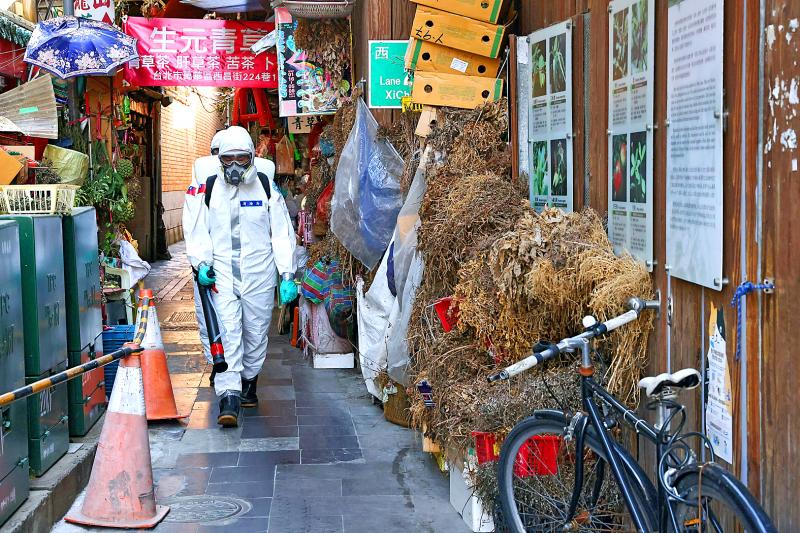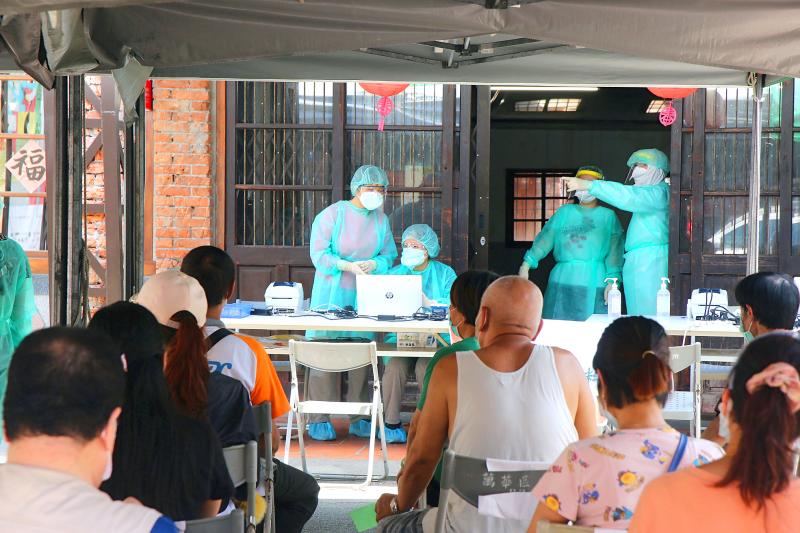The next two weeks are critical for containing the COVID-19 outbreak, which hinges on the cooperation of confirmed cases and the public, infectious-disease experts said on Saturday.
After a sharp spike in cases, the Central Epidemic Command Center on Saturday raised the pandemic alert for Taipei and New Taipei City to level 3 until May 28.
While serious, Taiwan would make it through if the outbreak is contained over the next two weeks, said Chen Yee-chun (陳宜君), director of National Taiwan University Hospital’s (NTUH) Division of Infectious Diseases.

Photo: Ann Wang, Reuters
Cases have been climbing so rapidly due in part to the reluctance of confirmed cases to report their whereabouts, Chen said.
If there are any omissions, it makes it difficult to trace all of the contacts and prevent the virus from spreading further, she said.
Those who do not immediately report the places they have visited are exposing their friends and family to the greatest risk, she added.

Photo: Cheng Ming-hsiang, Taipei Times
The spread of the UK variant should serve as a warning that people can no longer indulge in a sense of superiority about Taiwan’s pandemic success, Chen said.
“The medical world is most scared of the India variant, as it is more virulent and deadly,” she added.
Linkou Chang Gung Memorial Hospital deputy superintendent Chiu Cheng-hsun (邱政洵) said that he was “extremely surprised” at the 10 percent positivity rate at screening centers in Taipei’s Wanhua District (萬華).
At the height of the outbreak in New York last year, the positivity rate was also about 10 percent, Chiu said, adding that the rate in New Delhi has been higher than 30 percent.
A worst-case scenario would be if Taiwan saw more than 1,000 cases in one month, NTUH Division of Pediatric Infectious Diseases physician Lee Ping-ing (李秉穎) said.
Raising the threat level in Taipei and New Taipei City presents an opportunity to contain the outbreak, Lee said, adding that as long as residents follow guidelines, the outbreak could be contained.
There is absolutely the opportunity to stem the spread as long as people are honest, Chen said.
However, if people are not willing to work together, it is not impossible that the situation could deteriorate to the level seen in India, she added.
In addition to people wearing a mask, washing their hands and not touching their face, Lee urged everyone to avoid contact with unfamiliar people over the next two weeks to stem the outbreak’s spread.
Chiu also called on the government to restrict movement in heavily affected areas.
Residents of level 2 and level 3 cities should avoid moving between the two regions, Chiu said, adding that maintaining these measures for one to two weeks would significantly reduce the caseload.

The US government has signed defense cooperation agreements with Japan and the Philippines to boost the deterrence capabilities of countries in the first island chain, a report by the National Security Bureau (NSB) showed. The main countries on the first island chain include the two nations and Taiwan. The bureau is to present the report at a meeting of the legislature’s Foreign Affairs and National Defense Committee tomorrow. The US military has deployed Typhon missile systems to Japan’s Yamaguchi Prefecture and Zambales province in the Philippines during their joint military exercises. It has also installed NMESIS anti-ship systems in Japan’s Okinawa

TRAGEDY STRIKES TAIPEI: The suspect died after falling off a building after he threw smoke grenades into Taipei Main Station and went on a killing spree in Zhongshan A 27-year-old suspect allegedly threw smoke grenades in Taipei Main Station and then proceeded to Zhongshan MRT Station in a random killing spree that resulted in the death of the suspect and two other civilians, and seven injured, including one in critical condition, as of press time last night. The suspect, identified as a man surnamed Chang Wen (張文), allegedly began the attack at Taipei Main Station, the Taipei Fire Department said, adding that it received a report at 5:24pm that smoke grenades had been thrown in the station. One man in his 50s was rushed to hospital after a cardiac arrest

‘WIN-WIN’: The Philippines, and central and eastern European countries are important potential drone cooperation partners, Minister of Foreign Affairs Lin Chia-lung said Minister of Foreign Affairs Lin Chia-lung (林佳龍) in an interview published yesterday confirmed that there are joint ventures between Taiwan and Poland in the drone industry. Lin made the remark in an exclusive interview with the Chinese-language Liberty Times (the Taipei Times’ sister paper). The government-backed Taiwan Excellence Drone International Business Opportunities Alliance and the Polish Chamber of Unmanned Systems on Wednesday last week signed a memorandum of understanding in Poland to develop a “non-China” supply chain for drones and work together on key technologies. Asked if Taiwan prioritized Poland among central and eastern European countries in drone collaboration, Lin

ON ALERT: Taiwan’s partners would issue warnings if China attempted to use Interpol to target Taiwanese, and the global body has mechanisms to prevent it, an official said China has stationed two to four people specializing in Taiwan affairs at its embassies in several democratic countries to monitor and harass Taiwanese, actions that the host nations would not tolerate, National Security Bureau (NSB) Director-General Tsai Ming-yen (蔡明彥) said yesterday. Tsai made the comments at a meeting of the legislature’s Foreign Affairs and National Defense Committee, which asked him and Minister of National Defense Wellington Koo (顧立雄) to report on potential conflicts in the Taiwan Strait and military preparedness. Democratic Progressive Party (DPP) Legislator Michelle Lin (林楚茵) expressed concern that Beijing has posted personnel from China’s Taiwan Affairs Office to its